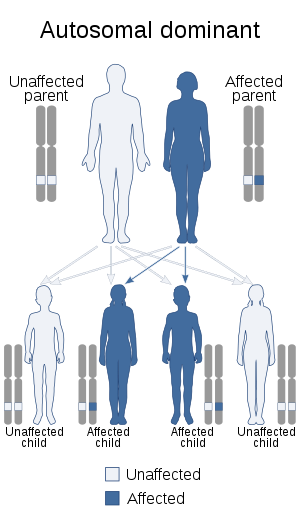Adermatoglyphia
Adermatoglyphia is an extremely rare genetic disorder that prevents the development of fingerprints. Five extended families worldwide are known to be affected by this condition.[1][2]
| Adermatoglyphia | |
|---|---|
| Other names | Immigration delay disease |
 | |
| Adermatoglyphia is inherited in an autosomal dominant manner | |
Case study
In 2007 an isolated finding was published regarding the description of a person from Switzerland who lacked fingerprints.[3] The phenotype was mapped to chromosome 4q22. In the splice-site of a 3' exon of the gene for SMARCAD1-helicase, a point mutation was detected. It results in a shortened form of the skin-specific protein.[4] The heterozygous mode of mutation suggests an autosomal dominant mode of inheritance.[5]
Other conditions can cause a lack of fingerprints, but unlike them, adermatoglyphia has no side effects.[6] Mutations in helicases are involved in other rare genetic diseases, such as Werner syndrome.[7]
References
- Reference, Genetics Home. "Adermatoglyphia". Genetics Home Reference. Retrieved 2020-07-07.
- "Adermatoglyphia disease: Malacards - Research Articles, Drugs, Genes, Clinical Trials". www.malacards.org. Retrieved 2020-07-07.
- Burger B, Fuchs D, Sprecher E, Itin P (May 2011). "The immigration delay disease: adermatoglyphia-inherited absence of epidermal ridges". J. Am. Acad. Dermatol. 64 (5): 974–80. doi:10.1016/j.jaad.2009.11.013. PMID 20619487.
- Stromberg, Joseph. "Adermatoglyphia: The Genetic Disorder Of People Born Without Fingerprints". Smithsonian Magazine. Retrieved 2020-07-07.
- Nousbeck J, Burger B, Fuchs-Telem D, et al. (August 2011). "A mutation in a skin-specific isoform of SMARCAD1 causes autosomal-dominant adermatoglyphia". Am. J. Hum. Genet. 89 (2): 302–7. doi:10.1016/j.ajhg.2011.07.004. PMC 3155166. PMID 21820097.
- Kaufman, Rachel (August 9, 2011). "Mutated DNA Causes No-Fingerprint Disease". National Geographic News.
- Sarfraz, Nuraiz; N, Sarfraz (2019-02-08). "Adermatoglyphia: Barriers to Biometric Identification and the Need for a Standardized Alternative". Cureus Journal of Medical Science. 11 (2). doi:10.7759/cureus.4040.
External links

| Classification | |
|---|---|
| External resources |